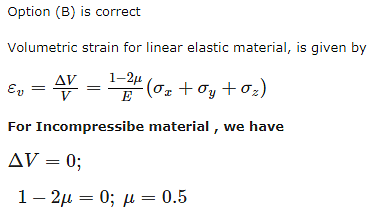Mechanical Engineering Exam > Mechanical Engineering Questions > The Poisson"s ratio for a perfectly incom...
Start Learning for Free
The Poisson"s ratio for a perfectly incompressible linear elastic material is
- a)1
- b)0.5
- c)0
- d)infinity
Correct answer is option 'B'. Can you explain this answer?
| FREE This question is part of | Download PDF Attempt this Test |
Verified Answer
The Poisson"s ratio for a perfectly incompressible linear elastic ...

Most Upvoted Answer
The Poisson"s ratio for a perfectly incompressible linear elastic ...
Poisson's Ratio for a Perfectly Incompressible Linear Elastic Material
In the field of mechanics and material science, Poisson's ratio is a dimensionless quantity that describes the response of a material to applied forces. It is defined as the ratio of lateral strain to axial strain when a material is subjected to uniaxial stress. Poisson's ratio is denoted by the Greek letter ν (nu).
Explanation:
Poisson's ratio is a measure of the deformation that occurs in a material when it is subjected to an external force. It relates the change in transverse strain (lateral strain) to the change in axial strain (longitudinal strain).
For a perfectly incompressible material, the Poisson's ratio is 0.5. This means that when a force is applied to the material, the material will not change its volume but will only deform in the lateral direction.
Perfectly Incompressible Material:
A perfectly incompressible material is an idealized concept where the volume of the material remains constant regardless of the applied forces. In reality, no material is perfectly incompressible, but some materials, such as liquids and certain rubbers, have very high bulk moduli and can be considered nearly incompressible for certain applications.
Interpretation of Poisson's Ratio:
Poisson's ratio can range from -1 to 0.5. A positive value indicates that the material contracts laterally when stretched axially, while a negative value indicates that the material expands laterally when stretched axially.
When Poisson's ratio is 0, it indicates that the material is incompressible and does not deform laterally when subjected to axial stress. In this case, the material only experiences axial strain, and there is no change in volume.
In the case of a perfectly incompressible material, Poisson's ratio is 0.5. This means that when the material is subjected to axial stress, it will deform equally in all directions, maintaining its volume constant. The material will not change its shape or size, but only deform laterally.
To summarize, the correct answer to the given question is option 'B' (0.5) because for a perfectly incompressible linear elastic material, the Poisson's ratio is 0.5.
In the field of mechanics and material science, Poisson's ratio is a dimensionless quantity that describes the response of a material to applied forces. It is defined as the ratio of lateral strain to axial strain when a material is subjected to uniaxial stress. Poisson's ratio is denoted by the Greek letter ν (nu).
Explanation:
Poisson's ratio is a measure of the deformation that occurs in a material when it is subjected to an external force. It relates the change in transverse strain (lateral strain) to the change in axial strain (longitudinal strain).
For a perfectly incompressible material, the Poisson's ratio is 0.5. This means that when a force is applied to the material, the material will not change its volume but will only deform in the lateral direction.
Perfectly Incompressible Material:
A perfectly incompressible material is an idealized concept where the volume of the material remains constant regardless of the applied forces. In reality, no material is perfectly incompressible, but some materials, such as liquids and certain rubbers, have very high bulk moduli and can be considered nearly incompressible for certain applications.
Interpretation of Poisson's Ratio:
Poisson's ratio can range from -1 to 0.5. A positive value indicates that the material contracts laterally when stretched axially, while a negative value indicates that the material expands laterally when stretched axially.
When Poisson's ratio is 0, it indicates that the material is incompressible and does not deform laterally when subjected to axial stress. In this case, the material only experiences axial strain, and there is no change in volume.
In the case of a perfectly incompressible material, Poisson's ratio is 0.5. This means that when the material is subjected to axial stress, it will deform equally in all directions, maintaining its volume constant. The material will not change its shape or size, but only deform laterally.
To summarize, the correct answer to the given question is option 'B' (0.5) because for a perfectly incompressible linear elastic material, the Poisson's ratio is 0.5.
Free Test
FREE
| Start Free Test |
Community Answer
The Poisson"s ratio for a perfectly incompressible linear elastic ...
0.5
Attention Mechanical Engineering Students!
To make sure you are not studying endlessly, EduRev has designed Mechanical Engineering study material, with Structured Courses, Videos, & Test Series. Plus get personalized analysis, doubt solving and improvement plans to achieve a great score in Mechanical Engineering.

|
Explore Courses for Mechanical Engineering exam
|

|
Similar Mechanical Engineering Doubts
The Poisson"s ratio for a perfectly incompressible linear elastic material isa)1b)0.5c)0d)infinityCorrect answer is option 'B'. Can you explain this answer?
Question Description
The Poisson"s ratio for a perfectly incompressible linear elastic material isa)1b)0.5c)0d)infinityCorrect answer is option 'B'. Can you explain this answer? for Mechanical Engineering 2024 is part of Mechanical Engineering preparation. The Question and answers have been prepared according to the Mechanical Engineering exam syllabus. Information about The Poisson"s ratio for a perfectly incompressible linear elastic material isa)1b)0.5c)0d)infinityCorrect answer is option 'B'. Can you explain this answer? covers all topics & solutions for Mechanical Engineering 2024 Exam. Find important definitions, questions, meanings, examples, exercises and tests below for The Poisson"s ratio for a perfectly incompressible linear elastic material isa)1b)0.5c)0d)infinityCorrect answer is option 'B'. Can you explain this answer?.
The Poisson"s ratio for a perfectly incompressible linear elastic material isa)1b)0.5c)0d)infinityCorrect answer is option 'B'. Can you explain this answer? for Mechanical Engineering 2024 is part of Mechanical Engineering preparation. The Question and answers have been prepared according to the Mechanical Engineering exam syllabus. Information about The Poisson"s ratio for a perfectly incompressible linear elastic material isa)1b)0.5c)0d)infinityCorrect answer is option 'B'. Can you explain this answer? covers all topics & solutions for Mechanical Engineering 2024 Exam. Find important definitions, questions, meanings, examples, exercises and tests below for The Poisson"s ratio for a perfectly incompressible linear elastic material isa)1b)0.5c)0d)infinityCorrect answer is option 'B'. Can you explain this answer?.
Solutions for The Poisson"s ratio for a perfectly incompressible linear elastic material isa)1b)0.5c)0d)infinityCorrect answer is option 'B'. Can you explain this answer? in English & in Hindi are available as part of our courses for Mechanical Engineering.
Download more important topics, notes, lectures and mock test series for Mechanical Engineering Exam by signing up for free.
Here you can find the meaning of The Poisson"s ratio for a perfectly incompressible linear elastic material isa)1b)0.5c)0d)infinityCorrect answer is option 'B'. Can you explain this answer? defined & explained in the simplest way possible. Besides giving the explanation of
The Poisson"s ratio for a perfectly incompressible linear elastic material isa)1b)0.5c)0d)infinityCorrect answer is option 'B'. Can you explain this answer?, a detailed solution for The Poisson"s ratio for a perfectly incompressible linear elastic material isa)1b)0.5c)0d)infinityCorrect answer is option 'B'. Can you explain this answer? has been provided alongside types of The Poisson"s ratio for a perfectly incompressible linear elastic material isa)1b)0.5c)0d)infinityCorrect answer is option 'B'. Can you explain this answer? theory, EduRev gives you an
ample number of questions to practice The Poisson"s ratio for a perfectly incompressible linear elastic material isa)1b)0.5c)0d)infinityCorrect answer is option 'B'. Can you explain this answer? tests, examples and also practice Mechanical Engineering tests.

|
Explore Courses for Mechanical Engineering exam
|

|
Suggested Free Tests
Signup for Free!
Signup to see your scores go up within 7 days! Learn & Practice with 1000+ FREE Notes, Videos & Tests.
























